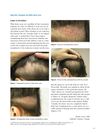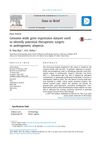 4 citations,
October 2022 in “Genes”
4 citations,
October 2022 in “Genes” Our microbiome may affect the development of the hair loss condition Alopecia Areata, but more research is needed to understand this relationship.
 3 citations,
October 2023 in “Military Medical Research/Military medical research”
3 citations,
October 2023 in “Military Medical Research/Military medical research” Regulatory T cells help heal skin and grow hair, and their absence can lead to healing issues and hair loss.
3 citations,
March 2023 in “Biology” Genes affecting wool fiber thickness in Angora rabbits were identified, which could help breed finer wool.
 2 citations,
September 2022 in “Frontiers in Immunology”
2 citations,
September 2022 in “Frontiers in Immunology” T-regulatory cells are important for skin health and can affect hair growth and reduce skin inflammation.
1 citations,
January 2024 in “International journal of molecular sciences” MicroRNAs could be key biomarkers and therapeutic targets for PCOS.
1 citations,
November 2023 in “International journal of molecular sciences” Cannabinoids might help treat skin problems but more research is needed to be sure.
 1 citations,
July 2023 in “Communications biology”
1 citations,
July 2023 in “Communications biology” Removing Mediator 1 from certain mouse cells causes teeth to grow hair instead of enamel.
 1 citations,
December 2022 in “Frontiers in Immunology”
1 citations,
December 2022 in “Frontiers in Immunology” Tissue environment greatly affects the unique epigenetic makeup of regulatory T cells, which could impact autoimmune disease treatment.
 1 citations,
October 2022 in “Annals of Translational Medicine”
1 citations,
October 2022 in “Annals of Translational Medicine” Cucurbitacin helps mice grow hair by blocking a protein that stops hair growth.
 August 2024 in “Applied Sciences”
August 2024 in “Applied Sciences” Plant extracts may help prevent or reverse hair graying.
 August 2024 in “International Journal of Molecular Sciences”
August 2024 in “International Journal of Molecular Sciences” Androgenetic alopecia involves immune cell disruptions, especially increased CD4+ T cells around hair follicles.
 April 2024 in “Military Medical Research/Military medical research”
April 2024 in “Military Medical Research/Military medical research” Cellular and immunotherapies show promise for healing chronic wounds but need more research.
 December 2023 in “International Journal of Molecular Sciences”
December 2023 in “International Journal of Molecular Sciences” Men with early balding showed higher levels of certain genes linked to hair loss and possibly prostate cancer.
 June 2023 in “Frontiers in Genetics”
June 2023 in “Frontiers in Genetics” Genes related to calcium signaling and lipid metabolism are important for curly hair in Mangalitza pigs.
 January 2023 in “Indian Dermatology Online Journal”
January 2023 in “Indian Dermatology Online Journal” No single ideal JAK inhibitor for alopecia areata has been determined; JAK3 inhibitors may be promising with fewer side effects.
June 2019 in “International journal of dermatology and venereology” The Hedgehog Signaling Pathway is important for skin and hair development and skin cancer treatment, but more research is needed to understand it fully.
 6 citations,
March 2008 in “Dermatologic Surgery”
6 citations,
March 2008 in “Dermatologic Surgery” Transplanting chest hair into scars can effectively treat wide donor scars from hair restoration surgery.
717 citations,
June 2010 in “Nature” Alopecia areata involves both innate and adaptive immunity, with specific genes linked to the disease.
 191 citations,
September 2011 in “Cell stem cell”
191 citations,
September 2011 in “Cell stem cell” Hair follicle stem cells use specific chromatin changes to control their growth and differentiation.
 78 citations,
August 2012 in “Human molecular genetics online/Human molecular genetics”
78 citations,
August 2012 in “Human molecular genetics online/Human molecular genetics” A new gene, JMJD1C, may affect testosterone levels in men.
 77 citations,
April 2009 in “British Journal of Dermatology”
77 citations,
April 2009 in “British Journal of Dermatology” Aromatase gene variation may increase female hair loss risk.
 62 citations,
March 2008 in “American Journal of Human Genetics”
62 citations,
March 2008 in “American Journal of Human Genetics” Hair loss gene found on chromosome 3q26.
 58 citations,
June 2018 in “Scientific reports”
58 citations,
June 2018 in “Scientific reports” Researchers found 15 new genetic links to skin traits in Japanese women.
 43 citations,
November 2018 in “Nature Communications”
43 citations,
November 2018 in “Nature Communications” Genetic variations affecting skin structure play a key role in severe acne.
 25 citations,
March 2012 in “Journal of Dermatological Science”
25 citations,
March 2012 in “Journal of Dermatological Science” Genetic variants linked to ten skin diseases were found, showing both immune and non-immune factors play a role.
 13 citations,
August 2017 in “Scientific reports”
13 citations,
August 2017 in “Scientific reports” Researchers developed a cost-effective 66 K SNP chip for cashmere goats that is accurate and useful for genetic studies.
 12 citations,
February 2021 in “Translational Psychiatry”
12 citations,
February 2021 in “Translational Psychiatry” Researchers found two new genetic variants linked to Alzheimer's disease.
 9 citations,
June 2020 in “Animal genetics”
9 citations,
June 2020 in “Animal genetics” Scientists found genes linked to hair length in Brangus cattle that could help breed heat-tolerant cattle.
6 citations,
January 2022 in “Gene” Scientists found 53 keratin genes in yaks that are important for hair growth and share similarities with those in other animals.
 4 citations,
May 2017 in “Data in Brief”
4 citations,
May 2017 in “Data in Brief” Five molecular elements identified as potential future targets for hair loss therapy.
























